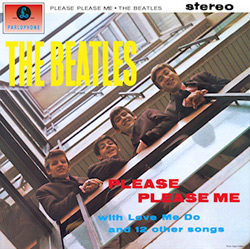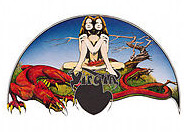20th /21st Century Music and EMI
Vivendi SA’s subsidiary, Universal Music, plans to buy the EMI Group. This represents the continuing consolidation of the music recording and publishing industries, and the Independent Music Companies Association, a Euro-centered trade group, says it will fight the merger. Furthermore, various regulators and state attorneys general may in principle yet threaten it. But the likelihood remains that EMI – one of the most renowned music studios of the 20th century – think of Queen, the Beatles, and the Rolling Stones! – and these early years of the 21st century too, will lose its existence as an independent entity. And this occasion requires some reminiscence.
Two Beatles Album Covers

Beatles’ album, Please Please Me
EMI (the letters come from the phrase “Electric and Musical Industries”) dates its corporate history back to 1931. Also in 1931, the new company opened a studio on Abbey Road, in London. Beginning in 1960, their corporate headquarters was at 20 Manchester Square, also in London. The stairwell in the Manchester Square building is featured on the cover of a Beatles’ album, Please Please Me.
For a special trip down memory lane, here’s the full track list from that album:
I Saw Her Standing There
Misery
Anna (Go to Him)
Chains
Ask Me Why
Please Please Me
Love Me Do
P.S. I Love You
Baby It’s You
Do You Want to Know a Secret
A Taste of Honey
There’s a Place
Twist and Shout.
Of course Abbey Road itself, right outside their recording studio, is also featured in a Beatles’ cover – the one in which Paul McCartney is notoriously barefoot.
Many Labels
Nowadays, EMI is known under many labels, divided into groups, many of which have their own distinctive histories. There is the Blue Note Label Group, the Capitol Music Group (which now includes Virgin Records), Caroline Distribution, and the EMI Christian Music Group.
Angel Records, part of the Blue Note Group, has focused on recordings of classical music, notably including Nikolai Rimsky-Korsakov’s Scheherazade.
The mainstay of EMI’s Capital Music Group has been, as one might expect, Capital Records. Its former HQ, the Capitol Tower, constructed in 1957, remains a major Hollywood, California landmark.

Capitol Records
Capitol Records began life as an independent company, founded by singer/composer Jonny Mercer, in 1942. Its first recording session saw Martha Tilton sing “Moon Dreams,” accompanied by The Mellowaires & Orchestra. Johnny Mercer himself was there to supervise.
EMI acquired most of the equity in Capital in 1955.
It acquired Virgin Records in 1983. Virgin Records had been created by Richard Branson, Simon Draper, and Nik Powell eleven years before and its performers – both before and since EMI’s acquisition – have included Roy Orbison, Devo, Janet Jackson, Lenny Kravitz, and so forth. Though Branson has applied the “Virgin” label to a lot of other enterprises since then, including the airline company he set up in 1984, the record company was his first use of that moniker. The “virgin” use of “Virgin,” so to speak.

Virgin Records (Twins logo)
Virgin Records also came into the world with a striking logo, a young naked woman sitting on top a red serpent. We see her in mirrored form – thus, this has become known as the “Twins” logo.
The Spice Girls were an EMI/Virgin act in their heyday, formed in 1994, and according to one survey they were the biggest pop-cultural figures of the 1990s. One of their members, “Posh Spice,” became Victoria Beckham with her marriage to the soccer phenom David Beckham in 1999. Her solo career appears to have been a disappointment: EMI dropped her in 2002.
Along with Virgin Records, EMI acquired the rights to what are now known as the Caroline Distribution labels, an eclectic collection including Nature Sounds and Vanguard. Nature Sounds is a rap label, issuing artists such as Ayatollah, DJ Babu, and Strong Arm Steady. Vanguard began life as a classical label, but nowadays is better known for a variety of folk and blues artists.
EMI also has, as noted above, a Christian Music Group, headquartered in Brentwood, Tennessee, which has signed such artists as Jon Foreman, Patty Griffin, and Seabird. Foreman has distinguished himself from the rest of the Christian rock fraternity because he has found a place in the soundtrack of a film within the Transformers franchise.
 Here’s a sample of Seabird’s music, from their album Rocks into Rivers.
Here’s a sample of Seabird’s music, from their album Rocks into Rivers.
Recent History
In 2007, British financier Guy Hands took over EMI. Hands quickly ticked off a number of people, including Mick Jagger, who soon moved The Rolling Stones’ catalogue to Universal. Ed O’Brien, drummer for Radiohead, was also unhappy about Hands. O’Brien said that EMI had been taken over by “somebody who’s never owned a record company before … they don’t know what they’re dealing with.”
(I’m afraid I write as someone who only knows of the existence of Radiohead because the television show South Park once paid them tribute.)

O’Brien drummer for Radiohead
Nonetheless, O’Brien (pictured right) had a point: the main accomplishment of EMI during the years of Hands’ control was the acquisition of a lot of debt. They were borrowing, specifically, from Citigroup.
In February 2011, after extensive litigation, Citigroup was able to take EMI away from Hands in an effort to recoup its losses.
As Hands has admitted, the whole affair made him look like a “chump.” Heck, the expenditure on lawyers for the futile fight against Citigroup alone cost him $1 million (GB £630,000).
More important, Hands never seems to have worked at the underlying problem facing the music recording industry: it is an industry still in large measure set up to sell tangible things, CDs, in stores. It has still not quite accommodated itself to the very different world created by the internet.
Apple’s success with the iTunes store shows that it is possible for the music industry to make this transition. People are willing to pay a reasonable amount of money to purchase songs lawfully over the internet. But if their only choice is either to trudge out to a mall and buy a CD or to stay home in comfort and download a song for free: they’ll do the latter.
But let’s end where we began, with Johnny Mercer.


